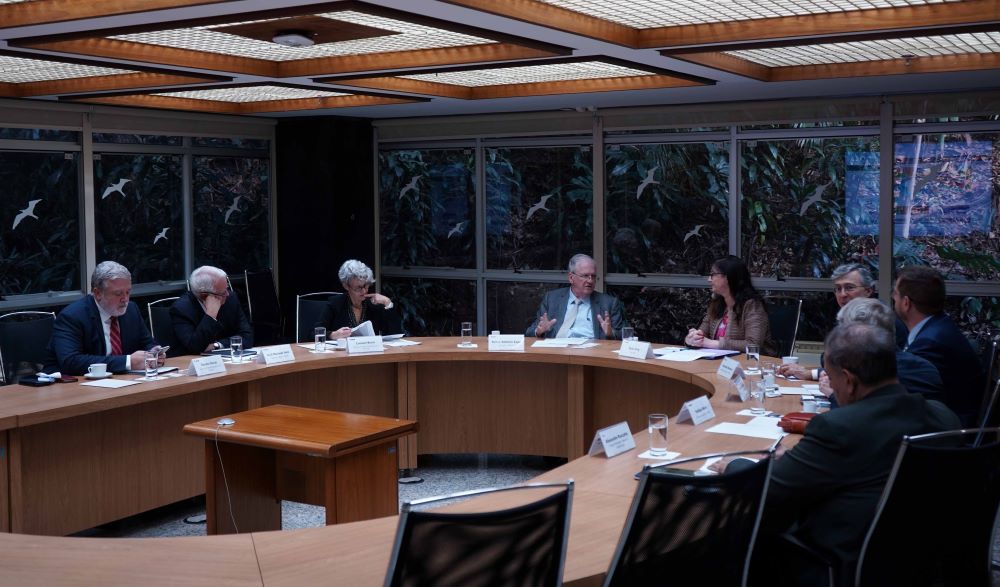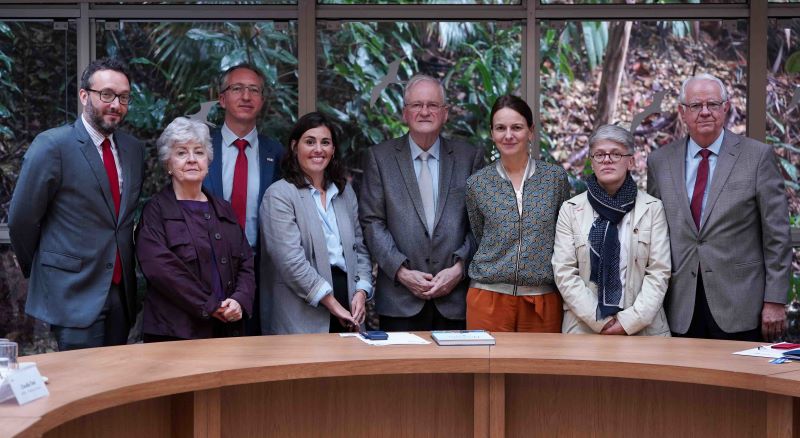

Marco Antonio Zago and Claire Giry at the head of the table (photo: Daniel Antônio/Agência FAPESP)
Leaders of FAPESP met with representatives of France’s National Research Agency (ANR), Ministry of Higher Education and Research, and Ministry of Foreign Affairs to intensify joint research and unveil CNRS’s new International Research Laboratory at the University of São Paulo.
Leaders of FAPESP met with representatives of France’s National Research Agency (ANR), Ministry of Higher Education and Research, and Ministry of Foreign Affairs to intensify joint research and unveil CNRS’s new International Research Laboratory at the University of São Paulo.

Marco Antonio Zago and Claire Giry at the head of the table (photo: Daniel Antônio/Agência FAPESP)
By Maria Fernanda Ziegler | Agência FAPESP – Leaders of FAPESP met on September 18 with Claire Giry, CEO of France’s National Research Agency (ANR), and officials of the French Higher Education and Research Ministry to extend scientific collaboration in a wide array of knowledge areas.
“The ANR has a long history of uninterrupted cooperation with FAPESP dating from 2011. Our collaboration has steadily grown. It’s important to note that both the number of agreements and the quality of the research have increased,” Giry said in an interview given to Agência FAPESP.
The ANR’s funding capacity has expanded as the number of joint laboratories has grown. “Collaboration naturally increases the impact and quality of the research we fund, so it’s important to maintain and intensify these partnerships, which also have significant innovation potential,” she added.
FAPESP also celebrated the long partnership with the ANR. Marco Antonio Zago, President of FAPESP, remarked on the many knowledge areas covered by the research collaborations concerned, such as mathematics, marine sciences, health and physics, and the opportunities for long-term projects. “We’re the only agency in Brazil that supports five-year or ten-year projects, thanks to the financial stability we’re fortunate to enjoy here at FAPESP,” he said.
Besides Zago and Giry, the meeting was attended by Donato Giorgi, Corinne Borel and Christophe Dessaux from the French Ministry of Higher Education and Research; and by Fernando Menezes, FAPESP’s Chief Administrative Officer; Raul Machado Neto, advisor to the President of FAPESP; Alexandre Roccatto, its Scientific Directorate’s Head of Programs; and Nadège Mézié, advisor to its Office of Research Collaboration.
France-Brazil season 2025
A France-Brazil season will be held in 2025 to celebrate the bicentenary of diplomatic relations between the two countries and strengthen common actions to address contemporary political, social and ecological challenges. Representatives of the French Ministry of Foreign Affairs visited FAPESP on September 16 for talks about the season.
They discussed strategies to favor research projects supported jointly by FAPESP and French institutions and to stimulate the creation of new joint calls for proposals and global laboratories. The talks also included plans for a 2025 edition of FAPESP Week in Paris and Toulouse.

Left to right: Mathieu Perrot, Claudia Toni, François Legué, Valentine Chazot, Marco Antonio Zago, Valérie Brisset, Nadège Mézié and Raul Machado (photo: Daniel Antônio/Agência FAPESP)
The two meetings at FAPESP took place in parallel with the Third France-University of São Paulo (USP) Week, held on September 16-20 to highlight the importance and longevity of cooperation between USP and French universities and research institutions.
The schedule comprised seminars, keynote presentations and round-table sessions, as well as the launch of a new CNRS International Research Laboratory (IRL) on USP’s Butantan campus. CNRS is France’s National Scientific Research Center. The Worlds in Transition IRL will focus on social and human sciences and is part of CNRS’s International Research Center (IRC) unveiled at USP in March (read more at: agencia.fapesp.br/51330).
The IRC’s mission is to promote collaboration between CNRS and USP, initially in seven major lines of research, and academic training of undergraduates, graduates, postdocs and early-career researchers.
Another IRL unveiled early this year on USP’s Ribeirão Preto campus will focus on immunology.
“CNRS has several instruments of cross-border cooperation, such as programs and international networks, labs and research centers. One of its six International Research Centers [IRCs] around the world was set up in 2013 at USP. This initiative shows how keen CNRS and USP are to intensify the existing cooperation by broadening and deepening these ties,” Cláudia Perrone Moises, professor at USP’s Law School and head of the Worlds in Transition IRL alongside François-Michel Le Tourneau, senior research fellow at CNRS, said in a press release.
CNRS has similar partnerships with the Universities of Arizona and Chicago in the United States, Imperial College London in the United Kingdom, the University of Tokyo in Japan, and the University of Sherbrooke in Canada.
“The new lab is looking ahead with multiple ambitions. It aims to serve as one more bridge between USP and CNRS, while also connecting the research universes of France and Brazil, facilitating contacts and mobility, and welcoming both small- and large-scale projects. The presence of permanent CNRS researchers is just one example of these possibilities,” a statement issued by CNRS said.
According to Zago, FAPESP will support collaborative research projects conducted by scientists affiliated with USP and CNRS, as well as seminars, meetings and other scientific activities, allocating a similar amount of funding to CNRS’s contribution. At the same time, USP will contribute salaries for researchers and administrative staff, as well as the IRC’s infrastructure and utilities.
“The initiative of supporting the establishment of international research centers in São Paulo state is part of a strategy pursued by FAPESP and São Paulo’s universities and research institutions to make the science done in the state more international,” Zago said.
Republish
The Agency FAPESP licenses news via Creative Commons (CC-BY-NC-ND) so that they can be republished free of charge and in a simple way by other digital or printed vehicles. Agência FAPESP must be credited as the source of the content being republished and the name of the reporter (if any) must be attributed. Using the HMTL button below allows compliance with these rules, detailed in Digital Republishing Policy FAPESP.





